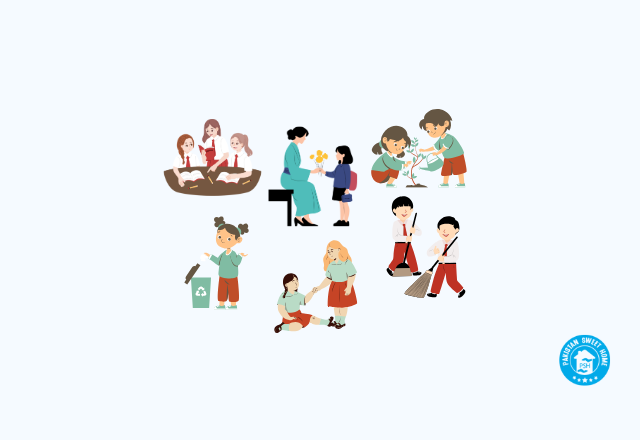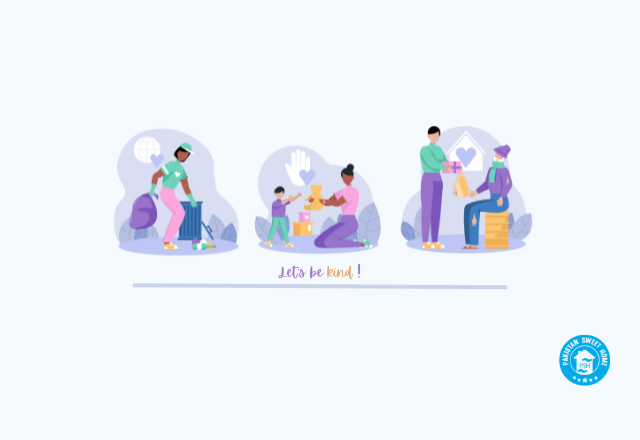Kindness has a unique power—it can transform someone’s day with just a small gesture.
Random acts of kindness for students are moments of compassion to help others and build stronger, more supportive environments. Imagine walking into a classroom where kindness is the norm—a place filled with respect, gratitude, and warmth.
The good news?
You don’t need grand gestures to spread positivity. Simple, thoughtful actions can inspire smiles and bring a sense of belonging to everyone around.
Now, let’s uncover thoughtful and creative ways students can incorporate kindness into their everyday routines.
What Are Random Acts of Kindness?
A random act of kindness is a selfless gesture meant to benefit or help someone without expecting anything in return. These actions, big or small, can leave a lasting impact on both the giver and the recipient.
Common examples include paying for someone’s coffee, leaving a kind note, or assisting a neighbor. For students, it could be as simple as sharing a pencil with a classmate or carrying a friend’s lunch tray. These small actions create a ripple of positivity in everyday life.
The Origin of Random Acts of Kindness
The idea of spreading kindness has existed for as long as humanity, but the phrase Random Acts of Kindness has a less clear origin. While it’s uncertain who first coined it, many attribute its rise in popularity to Anne Herbert, a California writer.
In 1985, Herbert published an article titled Practice Random Kindness and Senseless Acts of Beauty in the journal Whole Earth Review. She co-authored a children’s book with the same title in 1993, cementing the term’s place in popular culture.
The book, republished 20 years later with a foreword by Bishop Desmond Tutu, remains a valuable resource for educators promoting kindness in classrooms.
Another major contributor to the movement is the Random Acts of Kindness Foundation, founded in Colorado in the early 1990s. This non-profit organization has championed the global kindness movement, establishing February 17 as Random Acts of Kindness Day and promoting its mission to “Make Kindness the Norm.”
Why Random Acts of Kindness Matter for Students?
For students, performing acts of kindness isn't just about helping others—it also helps them grow as individuals. Research has shown that acts of kindness can reduce stress, improve happiness, and even boost academic performance.
When students engage in kind actions, it creates a ripple effect and inspires others to do the same. This ultimately fosters a culture of compassion within educational institutions.
Whether you’re looking to make a friend, brighten a classmate’s day, or just contribute to a positive atmosphere, kindness is a tool every student should carry in their backpack.
55 Random Acts of Kindness Ideas for Students
Following are the ways students can show kindness:
- Praise a Friend’s Achievement.
- Help a Friend with Homework.
- Hold the Door Open for Your Fellow.
- Write a Thank-You Note to a Teacher.
- Share Your Notes with Classfellows.
- Sit with Someone Alone.
- Donate Old School Supplies.
- Pick Up Trash Around Campus.
- Give a Hug to Someone Who Looks Down.
- Offer to Help a Younger Student with Their Classwork.
- Be a Buddy to a New Student.
- Let Someone Go Ahead in Line.
- Bring Extra Snacks for Your Friends or Family Members.
- Offer to Help Clean Up After an Event.
- Offer a Listening Ear.
- Give Someone Your Seat.
- Volunteer at an NGO.
- Create a Friendship Bracelet.
- Send an Encouraging Text to a Friend and Brighten His/Her Day.
- Share Your Favorite Book or Song.
- Write a Positive Social Media Post.
- Offer to Run Errands for a Teacher.
- Help Someone Carry Their Books.
- Ask Someone How Their Day Is Going.
- Compliment a Classmate's Work.
- Send a Classmate an Encouraging Note.
- Invite Someone to Join Your Study Group.
- Share Your Lunch or Snack.
- Set Up a Charity Box in Your Classroom
- Give Up Your Favorite Spot.
- Join a Community Volunteering Group at Your Institute.
- Share a Helpful Resource.
- Help Clean the Classroom.
- Leave a Kind Comment on a Friend’s Post.
- Introduce Yourself to Someone New.
- Be Patient with Others.
- Share Your Notes with a Student Who Missed Class.
- Create a Care Package for a Friend.
- Offer to Help a Classmate with Their Locker.
- Encourage Someone Shy to Participate.
- Compliment Someone’s Personality.
- Organize a Group Study Session.
- Greet and Thank Your Bus Driver.
- Send a Friend a Motivational Quote.
- Take the Time to Help Someone Confused.
- Give Someone a Positive Shoutout in Class.
- Share a Playlist or Movie Recommendation.
- Host a Virtual Hangout.
- Offer Your Umbrella in the Rain.
- Join a Peer Mentoring Program.
- Celebrate Kindness Week in Your School or College.
- Encourage Students Who Struggle with Low Grades.
- Kindness Bulletin Board.
- Support Younger Students by Visiting the Nursing Home.
- Leave Uplifting Sticky Notes or Positive Slips of Paper Around Your Campus.
The Impact of Random Acts of Kindness on Students
Performing random acts of kindness not only makes others feel good but also boosts your well-being. When you’re kind to others, your brain releases feel-good chemicals like oxytocin, serotonin, and dopamine. These chemicals can reduce stress and boost your mood, enhancing your overall educational experience.
Additionally, kindness fosters a sense of community. Students who regularly engage in kind acts contribute to a supportive environment where everyone feels valued. This can improve classroom dynamics, make students feel more connected, and even lead to better collaboration among peers.
In conclusion, kindness is contagious. As students, you have the power to create an environment where kindness is the norm. Every small act of kindness has the potential to spread, creating a ripple effect that can change your institution's culture.
Whether it's helping someone with their homework, offering a smile, or simply being there for a friend, your actions can make a world of difference.
At a larger scale, institutions like Pakistan Sweet Home remind us how powerful collective kindness can be. Even a small orphanage donation can bring lasting change to the lives of children who depend on our support.
So, don’t wait for someone else to start—be the kindness you want to see in your institute and beyond!
Support an Orphan's Education
Dr. Ayesha Khan is a dedicated social worker with over 15 years of experience in child welfare and community development. As a passionate advocate for vulnerable children, she has worked tirelessly to create safe and nurturing environments for orphans and underprivileged youth. Dr. Khan holds a PhD in Social Work and has specialized in developing sustainable programs that support the holistic development of children. Through her work at Pakistan Sweet Home, she aims to raise awareness and inspire action through her insightful and compassionate writing.
Dr. Ayesha Khan is a dedicated social worker with over 15 years of experience in child welfare and community development. As a passionate advocate for vulnerable children, she has worked tirelessly to create safe and nurturing environments for orphans and underprivileged youth. Dr. Khan holds a PhD in Social Work and has specialized in developing sustainable programs that support the holistic development of children. Through her work at Pakistan Sweet Home, she aims to raise awareness and inspire action through her insightful and compassionate writing.

info@pakistansweethome.org.pk
(051) 4865856
+92 335 1118477






